Related Research Articles
A reform movement or reformism is a type of social movement that aims to bring a social or also a political system closer to the community's ideal. A reform movement is distinguished from more radical social movements such as revolutionary movements which reject those old ideals, in that the ideas are often grounded in liberalism, although they may be rooted in socialist or religious concepts. Some rely on personal transformation; others rely on small collectives, such as Mahatma Gandhi's spinning wheel and the self-sustaining village economy, as a mode of social change. Reactionary movements, which can arise against any of these, attempt to put things back the way they were before any successes the new reform movement(s) enjoyed, or to prevent any such successes.

The State University of New York at Binghamton is a public research university with campuses in Binghamton, Vestal, and Johnson City, New York. It is one of the four university centers in the State University of New York (SUNY) system. As of Fall 2020, 18,128 undergraduate and graduate students attended the university.
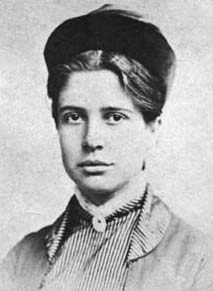
Florence Moltrop Kelley was a social and political reformer and the pioneer of the term wage abolitionism. Her work against sweatshops and for the minimum wage, eight-hour workdays, and children's rights is widely regarded today.

Blanche Wiesen Cook is a historian and professor of history. She is a recipient of the Bill Whitehead Award.

Alexander Street is an electronic academic database publisher. It was founded in May 2000 in Alexandria, Virginia, by Stephen Rhind-Tutt (President), Janice Cronin (CFO), and Eileen Lawrence. As of January 2016, the company had grown to more than 100 employees with offices in the United States, Australia, Brazil, China, and the United Kingdom. In June 2016, it was acquired by ProQuest.
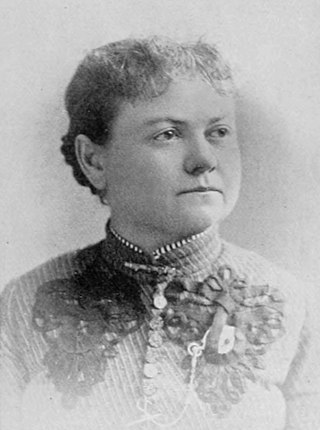
Alzina Stevens was an American labor leader, social reformer, and editor, active in Hull House. She was one of the representative women in the order of the Knights of Labor and an ardent advocate of equal suffrage. She served on the editorial staff of the Toledo Bee and half owner and editor of the Vanguard, an organ of the People's Party. Although her marriage to Mr. Stevens in 1876 or 1877, ended in divorce soon after, she kept her husband's name.
The New York Female Moral Reform Society (NYFMRS) was established in 1834 under the leadership of Lydia A. Finney, wife of revivalist Charles Grandison Finney. The NYFMRS was created for the fundamental purpose of preventing prostitution in early 19th century New York.
Thomas Dublin is an American historian, editor and professor at Binghamton University. He is a social historian specialized in the working-class experience in the United States, particularly throughout New England and the Mid-Atlantic states.
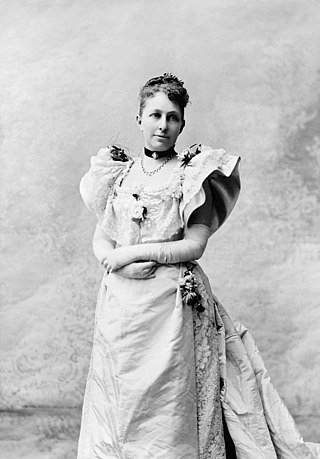
Ellen Martin Henrotin was a wealthy American society matron, labor reform activist, club leader and social reformer affiliated with social welfare and suffrage movements.
Kathryn (Kitty) Kish Sklar is an American historian, author, and professor. Her work focuses on the history of women's participation in social movements, voluntary organizations, and American public culture.
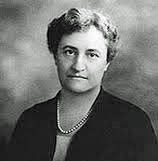
Hannah Hallowell Clothier Hull was an American clubwoman, feminist, and pacifist, one of the founders and leaders of the Women's Peace Party and the Women's International League for Peace and Freedom.

Leopoldine Kulka was an Austrian writer and editor. As editor of Neues Frauenleben she controversially met women from combatant countries at the 1915 Women's conference at the Hague.

Alice Elizabeth Locke Park was an American suffragist and a longtime defender of women's rights. She served as associate director of the Susan B. Anthony Memorial Committee of California.
The New England Female Moral Reform Society was originally called the Boston Female Moral Reform Society at the time it was founded in 1835. The group changed their name in 1838 in response to a rivalry with the New York Female Moral Reform Society for support among women in auxiliary societies. The goal of the New England Female Moral Reform Society, as well as the other moral reform societies at the time, was to prevent prostitution and to end the sexual double standard. In 1844 the society opened a home for reformed prostitutes. In the first volume of their semi-monthly periodical, the society asserted that men and women were equally liable for the immoral sexual actions that they performed together.

Emma Wold was an American suffragist. She was president of the College Equal Suffrage Association in Oregon, and later served as the headquarters secretary of the National Woman's Party.
Sarah Louisa Forten Purvis (1814–1884) was an American poet and abolitionist from Philadelphia, Pennsylvania. She co-founded The Philadelphia Female Anti-Slavery Society and contributed many poems to the anti-slavery newspaper The Liberator. She was an important figure for the history of abolitionism and feminism.

Elizabeth Glendower Evans was an American social reformer and suffragist.

Woman's Day, also known as National Woman's Day, was a commemoration conceived by labor activist Theresa Malkiel, and organized principally in New York City by the Socialist Party of America on the last Sunday in February in 1909 and 1910. It was the immediate predecessor to International Women's Day which began to develop globally in 1911, although it was still observed in the United States in February rather than in March for several years.

Alice Bertha Curtis was an American suffragist active with the National American Woman's Suffrage Association, a college professor, author of two fictionalized childhood memoirs, Children of the Prairie (1938) and Winter on the Prairie (1945), and the writer of the short story "Wings of Mercy" that was adapted for the 1937 RKO movie The Man Who Found Himself.
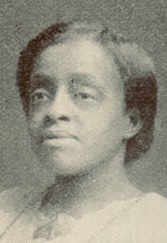
The Online Biographical Dictionary of the Woman Suffrage Movement in the United States is a free-access resource of approximately 3,700 biographies of people associated with the campaign for a woman's right to vote in public elections in the United States. Published by the journal Women and Social Movements, hosted by Alexander Street, and edited by Thomas Dublin and Kathryn Kish Sklar, the biographies were created by volunteers.
References
- ↑ Kathryn Kish Sklar and Thomas Dublin, "Creating Meaning in a Sea of Information: The Women and Social Movements Sites" in Jack Dougherty and Kristen Nawrotzki eds, Writing History in the Digital Age (Ann Arbor: University of Michigan Press, 2013), 146-158.
- ↑ "Kathryn Kish Sklar, "Teaching Students to Become Producers of New Historical Knowledge on the Web," Journal of American History 88 (March 2002): 1471-76" . Retrieved 6 October 2014.
- ↑ "Kathryn Kish Sklar and Thomas Dublin, "Keeping Up with the Web, 1997-2008: Women and Social Movements in the United States," Perspectives on History 47:5 (May 2009)" . Retrieved 6 October 2014.
- 1 2 Kathryn Kish Sklar and Thomas Dublin, "Launching a New Journal: Women and Social Movements in the United States, 1600-2000," Women's History Review 17, no. 1 (February 2008): 95-101.
- ↑ "Women and Social Movements in the United States, 1600 to 2000". Alexander Street Press. Retrieved 2 March 2014.
- ↑ About Women and Social Movements, International, by co-editors Kathryn Kish Sklar and Thomas Dublin.
- ↑ "Review: Women and Social Movements International, 1840 to the Present," History Workshop, accessed March 2, 2014, .